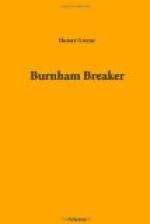“The question is not a proper one,” said the judge.
“Well,” continued Sharpman, “as a result of that meeting what were you to do?”
“I was to bring his son to him the following day.”
“Did you bring him?”
“I did not.”
“Why not?”
“Mr. Burnham died that night.”
“What did you do then?”
“I went to you for advice.”
“In pursuance of that advice, did you have an interview with the boy Ralph?”
“I did.”
“Where?”
“At your office.”
“Did you explain to him the facts concerning his parentage and history?”
“They were explained to him.”
“What did he say he wished you to do for him?”
Goodlaw interrupted again, to object to the testimony offered as incompetent and thereupon ensued an argument between counsel, which was cut short by the judge ordering the testimony to be excluded, and directing a bill of exceptions to be sealed for the plaintiff.
The hour for the noon recess had now come, and court was adjourned to meet again at two o’clock.
When the afternoon session was called, Sharpman announced that he was through with the direct examination of Craft.
Then Goodlaw took the witness in hand. He asked many questions about Craft’s personal history, about the wreck, and about the rescue of the child. He demanded a full account of the way in which Robert Burnham had been discovered, by the witness and found to be Ralph’s father. He called for the explicit reason for every opinion given, but Old Simon was on safe ground, and his testimony remained unshaken.
Finally, Goodlaw asked:—
“What is your occupation, Mr. Craft?” and Craft answered: “I have no occupation at present, except to see that this boy gets his rights.”
“What was your occupation during the time that this boy lived with you?”
“I was a travelling salesman.”
“What did you sell?”
“Jewelry, mostly.”
“For whom did you sell the jewelry?”
“For myself, and others who employed me.”
“Where did you obtain the goods you sold?”
“Some of it I bought, some of it I sold on commission.”
“Of whom did you buy it?”
“Sometimes I bought it at auction, or at sheriff’s sales; sometimes of private parties; sometimes of manufacturers and wholesalers.”
Goodlaw rose to his feet. “Now, as a matter of fact, sir,” he said, sternly, “did not you retail goods through the country that had been furnished to you by your confederates in crime? and was not your house in the city a place for the reception of stolen wares?”
Craft’s cane came to the floor with a sharp rap. “No, sir!” he replied, with much indignation; “I have never harbored thieves, nor sold stolen goods to my knowledge. You insult me, sir!”
Goodlaw resumed his seat, looked at some notes in pencil on a slip of paper, and then resumed the examination.




